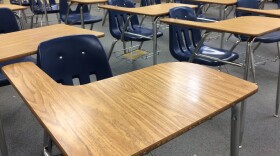While many of their friends are hanging out at the mall or playing video games at home during the summer, about 40 high school sophomores and juniors are spending their vacation days in class. But unlike a typical summer school… this program actually pays them to be there.
One thing these students all have in common is that they're all Latino males who attend either Northridge or Greeley Central High School. Another common characteristic: they're all considered at high risk of dropping out of school before getting a diploma.
Recent graduation data from the Colorado Department of Education finds Latino males are more likely to drop out than almost any other demographic group, second only to Native American and Alaska Native students. Poverty is a factor too. For students having to work to support family, school often must take a back seat.
Some get off track because they're struggling with math or language arts. Others, like 16-year-old Michael Rodriguez, have attendance problems stemming from home life that have pushed them off track.
"My first semester [of my sophomore year] I went to every class," Rodriguez says. "Second semester, I lost my father… and so that just really brought me down, and I said, ‘I'm kind of done with school.'"
The Student Recovery Program was developed just for students like Rodriguez. Operating in partnership with Greeley-Evans District 6 and the University of Northern Colorado, the program takes the unique approach of paying participants to attend classes during an 8-week summer session. For many of the students, it means they don't have to choose between earning a paycheck over the summer and graduating on time.
"Home life was more about making money, making sure the bills were paid… and making sure that Mom isn't having to struggle so much for us," recalls Sergio Ayala. He was among the program's first wave of graduates in 2011 -- and now works for SRP as one of its student advocates.
If you're wondering just how much SRP students can make - they are paid $5 a day for attendance and participation, and $15 to $25 when they complete a specific unit of study. They're paid weekly, with no cap on how much they can earn.
"I think people have really recognized that this impacts our community."
SRP Director Suzette Luster says when you look at the big picture, that's a small price to pay.
"I think people have really recognized the need to say that this impacts our community," Luster says. "Kids who fail to graduate high school are not as successful, they do not bring as many positives to our community, as those who achieve a high school diploma."
The program does not use school or taxpayer money - instead it's funded entirely by donations and state and local grants. It costs about $2,000 a year to put a student through the program.
Greeley businessman Bob Tointon helped create the program in 2007 after seeing the need for a small, more personalized program that would focus on only the most at-risk students. He says the idea of providing a financial incentive was part of the plan right from the start.
"After they have been in the class and are having some success, that's [no longer] the most important thing," Tointon says. "Yet I think it's still a key part of it, because some of these fellows need something to hook them in the first place."
Over the summer, a half-dozen staff members work with 40 SRP students, focusing on skills like English, reading comprehension and math. The program's blended learning approach combines online self-paced study with live instruction in smaller breakout groups.

During the regular school year, the program continues with Sergio Ayala and another advocate, as well as teachers and administrators who help provide mentoring and after-school tutoring. Aside from academics, students also learn some of the more intangible things that help them toward success.
"We try to teach communication skills so they can advocate for themselves," Ayala says. "A lot of these guys don't know how to express themselves to teachers, and that's where I come in. We want them to learn how to talk to a teacher if they're falling behind in class."
Bob Tointon, who is still one of the program's primary donors, says it's about second chances for these students.
"After all, you have to remember they're selected for this program because they're failing, it's not because they've had great success," Tointon says. "I've had people who had worked with these boys, and knew them, and who assured me that probably 90 percent of them would be dropouts if it weren't for this program."
The Student Recovery Program has an 81 percent graduation rate. That's actually higher than Colorado's current overall rate of 77.3 percent - and much higher than the state's 62.1 percent rate for Hispanic males.
It's even more remarkable, program director Suzette Luster says, considering how many SRP students might not graduate at all without the program's intervention.
"We are working with students who have been disengaged since middle school," Luster says. "I think taking those kids and trying to re-steer them in a positive direction and change the way they think about themselves and their future - I think that's good work."








